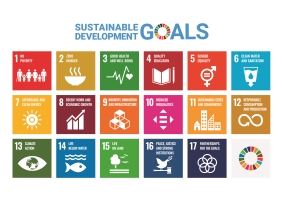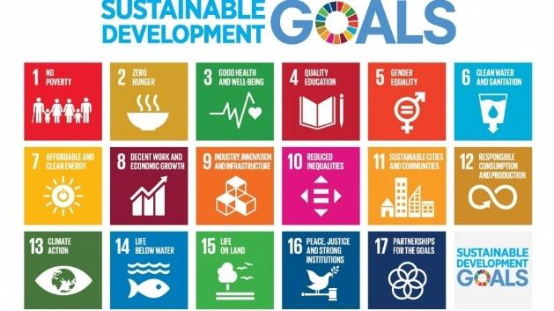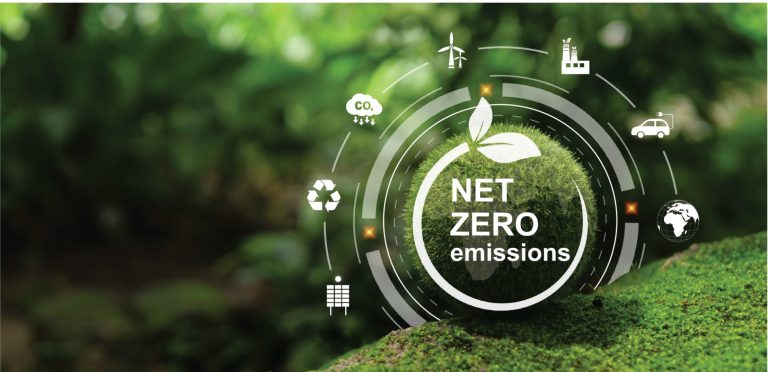1. Introduction
There is no country without environmental problems. Almost all countries in the world are experiencing this problem which is quite difficult to solve. Currently, there are many misfortunes caused by environmental changes. Environmental Change, as defined by Article 1 of the UNFCCC is an environmental change caused either directly or indirectly by human activities, which alters the creation of air around the world, and together with the impermanence of the normal environment, is seen over the same time span. Environmental change is a consequence of harmful atmospheric damage that adversely affects individual life activities. The detrimental consequences of environmental change include rising sea surface temperatures, extraordinary climate forces, changes in local wisdom examples and systems adapting to environmental changes in Southeast Asian districts, rainfall and large waves.(Ulf, 2018). This pessimistic effect economically affects people’s lives in dealing with the necessities of life as far as the economy, finance, and social aspects of Indonesian society. Environmental changes also affect the potential for disaster events to occur. Considering the consequences of hunting in the world disaster event information base (International Disaste Database), there are 345 catastrophic events that fall into the world disaster class. Around 60% of these disaster events are catastrophic events due to outrageous environmental events such as floods, dry seasons, forest fires, strong winds/storms, avalanches, high tsunamis, and spread of infection. Development is a process of change for the better through planned efforts. Another definition states development as a business or series of planned growth and change efforts that are consciously carried out by a nation, state and government, towards modernity in the context of nation building. As time goes by and the start of the concept and application of ecology in every order of life, development has undergone several paradigm shifts, starting from being oriented towards economic growth with GNP or Gross National Product, to the emergence of ideas that integrate economic growth, community participation and environmental protection known as the sustainable development paradigm. Indonesia was also affected and as a ratification of the Paris agreement, Indonesia must also incorporate the paradigm of sustainable development (sustainable development). Economic growthoriented development tends to utilize natural resources arbitrarily, without paying attention to the existing environmental aspects. As a result, environmental damage and pollution are increasingly common. These impacts can be detrimental or disrupt human life. Climate change causes changes in the physical conditions of the atmosphere, including temperature and distribution of rainfall which have a wide impact on various human lives. This is due to internal natural processes as well as external forces, or human activities that continuously change the composition of the atmosphere and land use. One of them is due to the amount of greenhouse gas (GHG) emissions in the atmosphere. Increasing the intensity of the greenhouse effect that occurs due to gases in the atmosphere that absorb heat rays, namely infrared rays emitted by the earth, causes global climate change. Climate change is indeed recognized as the greatest threat to our society and national development in the coming decades, potentially affecting large and diverse groups of people in both rural and urban areas in this century of progress. The SDGs development paradigm should have adopted climate change parameters or variables. This is because the SDGs paradigm has included economic, social, and ecological values as well as links or slices to these 3 aspects (economic, social, and ecological/physical environment). Climate change is indeed a physical process, but it must also be understood socio-economically. The sudden phenomenon of climate change can undermine the results that have been achieved and hinder the achievement of development goals. The world is currently still facing the Covid-19 pandemic. However, a study by the EcoHealth Alliance with World Research Universities predicts climate change could trigger new pandemics in the next few decades. The study estimates that climate change due to rising planetary temperatures could cause at least 15,000 viral mutations from animal species that can infect humans. However, climate change which always has a negative connotation is not always detrimental, in certain locations and conditions it can even be beneficial. One of them is the increase in the concentration of carbon dioxide (CO2) in the atmosphere. This condition provides an opportunity for plants to increase their dry matter production so that it can be used to compensate for the negative effects of high temperature stress, drought, inundation and salinity. One of the results of research conducted on legumes with simulations of high temperature stress and drought indicated that increasing CO2 concentrations were able to eliminate the negative effects of existing environmental stresses.(Lopes & Steidle Net, 2019). In addition, the adoption of life and the implementation of climate change resilience policies make cost savings and health improvements. Mitigation of climate change in various sectors, including housing, transport and energy, has many co-benefits leading to substantial health improvements and reduced health risks. This research will review climate change in the midst of Indonesia’s SDGs-based development from various multidisciplinary perspectives [15-20] as well as look for opportunities for adoption and mitigation in the midst of a mud puddle of the threat of climate change.
2. Literature Review
2.1. Climate Change
According to the Intergovernmental Panel on Climate Change (IPCC) the definition of climate change is Climate change is any change in climate at a certain time interval, whether caused by natural variations or due to human activities (anthropogenic). Meanwhile, Meteorology Climatology and Geophysics Agency(BMKG) defines climate change as a synthesis of weather-related activities over a long period of time, which is statistically sufficient to show differences from one period to another. Climate change as any change in climate at a certain time interval, whether caused by natural variations or due to human activities (anthropogenic). Climate change based on several studies is something that is visible and clearly visible, especially temperature changes that greatly affect several physical and biological systems around the world. The results of the IPCC study ensure that global climate change occurs because the earth’s atmosphere is filled with greenhouse gases (GHG), such as carbon dioxide and methane, which are produced by humans. Carbon dioxide gas occurs due to the process of burning fossil fuels with the aim of producing energy and also due to forest fires. Meanwhile, methane gas occurs due to waste disposal activities. GHGs have the ability to capture infrared rays from sunlight reflected by the earth. Climate change has a huge impact on various sectors such as rising sea levels, irregular weather cycles, health threats, availability of clean water and food security to environmental hygiene.All countries are encouraged to make various efforts as adaptation and mitigation measures to the impacts of climate change. Indonesia should be more vigilant IC-STCC-2022 IOP Conf. Series: Earth and Environmental Science 1105 (2022) 012040 IOP Publishing doi:10.1088/1755-1315/1105/1/0120403 because it is an archipelagic country located in the tropics, which is one of the countries most vulnerable to threats and impacts from climate change.
2.2. Indonesia’s SDGs Issue
The Sustainable Development Goals (SDGs) are global sustainable development agreements endorsed by the United Nations (United Nations) on 25 September 2015. The SDGs are global actions that are planned to achieve 17 goals and 169 targets for the next 15 years, starting from 2016 to 2030. The SDGs have 5 main principles, namely people, planet, prosperity, peace and partnership to realize the three noble goals in 2030 in the form of eradicating poverty, achieving equality and tackling climate change. In order to achieve these three noble goals, 17 global goals have been compiled.

Figure 1. SDGs Goals
3. Research Methodoly
This research will review climate change in the midst of Indonesia’s SDGs-based development from various multidisciplinary perspectives as well as look for opportunities for adoption and mitigation in the midst of a mud puddle of the threat of climate change. To achieve this goal, this paper elaborates 25 scientific articles related to Climate Change and multidisciplinary solutions which are divided into 4 constructs which were searched and refined from the largest research site, Google Scholar. The process of implementing this systematic literature review adopts the method used by Durst and Edvardsson (2012), namely: (1) determining the discussion area and literature searching, (2) determining the criteria for inclusion and exclusion boundaries, (3) conducting an in-depth analysis, and (4) do the final writing. The first step is to determine and input search keywords, namely: Climate Change agribusiness, Climate Change Higher Education, Climate Change Higher Public Health, Climate Change Socio-Cultural. The second step is to select and sort out the articles that meet the criteria and those that don’t. Then, 25 articles were obtained that were relevant to the discussion plan in the first step above. The third and fourth steps are conducting an in-depth analysis, revealing research findings and providing directions for future research related to the content and context of research in this literature review
4. Results
4.1. Climate Change and Indonesia’s SDGs in Agribusiness Perspective
The impact of climate change is ultimately felt by all sectors of life, but the greatest impact is felt in the agricultural sector. The decline, fertility and carrying capacity of land, causes yield productivity to also decrease, also with increasingly limited air availability and declining quality, also causes continued agricultural production. Coupled with the El Nino and La Nina phenomena which also greatly affect the climate cycle, it automatically causes a shift in the planting schedule of various agricultural commodities and increases the possibility of crop failure (puso). Such conditions make many parties worry about the impact of this Global Climate Change. Food organizations and the world’s Food and Agricultural Organization (FAO) are among the parties most concerned about agricultural conditions in development or food availability. Because the decline in productivity of agricultural products will also have an impact on decreasing the level of food security, while food security is one of the important factors in the resilience of a nation or country. A food crisis that occurs in a country will trigger other crises such as social crises and security crises, as has happened in several countries in Africa. The food crisis in these countries has triggered criminal acts, war security problems. This is what hinders the achievement of the SDGs, especially in Point 2. Several studies at FAO show that Indonesia as the country with the largest economy in Southeast Asia will suffer the most from climate change, especially droughts and floods. This is because this phenomenon will reduce food production and agricultural production capacity. For example, on theisland of Java due to climate change, it is predicted that there will be a 5% decline in production in 2025 and a 10% decline in the next 2050, the decline in production could even be more than that, this needs to be watched out and anticipated early
4.2. Climate change and Indonesia’s SDGs from the perspective of Higher Education
Universities are the leading actors in the success of achieving the SDGs in Indonesia, because they have the task of educating future leaders as well as other SDGs actors, such as NGOs and development institutions, through knowledge transfer, research and innovation. Professor and Chair of the Indonesian Climate Council Prof. Ir. Rachmat Witoelar, said that 95% of disasters in Indonesia are caused by climate change and environmental damage. Climate change that occurs throughout the earth’s surface is considered to have a strong meteorological effect. Universities play a key role in improving the quality and quantity of research in Indonesia, especially regarding climate change and sustainable development. What’s more, universities as education leader’s of the nation’s make future youth are a strategic place to forge the nation’s future mentality so that they are able to understand and dare to voice their concern for climate change.[32]. The active role of universities is expected to be a catalyst for the involvement of other non- governmental actors in supporting the implementation of the SDGs in Indonesia. Universities throughout Indonesia are expected to also play an active role like this in the success of achieving the SDGs. Thus, a synergy will be formed between the central/regional government and all non- government elements that can accelerate and facilitate the achievement of the SDGs in Indonesia.
4.3. Climate change and Indonesia’s SDGs from the perspective of Public Health
Indonesia is an archipelagic country located between the two continents of Asia and Australia and two oceans, namely the Pacific and the Atlantic. The climate in the territory of Indonesia has its own characteristics, so that not all areas of Indonesia have the same pattern of rain, temperature and humidity. This climate change tends to cause tropical disasters and diseases. Several diseases related to climate change are increasing, such as malaria, dengue, pneumonia, ARI, tuberculosis, diarrhea, and underfive nutrition. Climate change can have an impact on social, economic, health, namely epidemic patterns, vector and zoonotic infectious diseases, Dengue Fever, Malaria, Leptospirosis and other diseases. Whereas public health is a necessary component for socio-economic stability and a key aspect of Indonesia’s SDGs. Health is not only a single figure in the SDGs program, there are many SDGs programs that intersect with health including reducing poverty, contributing to economic growth, strengthening labor productivity, building a more just society, and responding to the need for gender equality.
4.4. Climate change and Indonesia’s SDGs from the perspective of Sociocultural
Climate change also affects social aspects, including global inequality, this is because the middle and lower classes of society bear the brunt of climate change. They have to face big challenges that affect their sustainability, such as food security, work situation, water availability and facing infectious diseases. They often lack access to the services, resources and information needed to mitigate and respond to crises by groups that have reached their limit. is performing. Widows, persons with disabilities, and even marginalized groups have to work harder amidst the pressures of climate change. Climate change is more than just an environmental crisis. It is a social crisis that is forcing us to address inequality on many levels. It affects nation, nation within nation, gender, and generation. Although the development of science and technology has advanced rapidly plus various forms of policy patterns have been formed to support the transition to low-carbon and climate-resilient development. However, the tough challenge above is to engage people who don’t understand climate change, and garner support. In addition, most people feel that the policies made have not been fair to them. Therefore, it is important to involve public participation and information disclosure in making a policy. This includes access to information and citizen engagement on climate risks and green growth to create coalitions of public support or demand to reduce climate impacts and to address behavioral and political inactions for decarbonization, as well as to generate new ideas and proprietary solutions.
4.5. Indonesia’s SDGs multidisciplinary diamond strategy in the issue of climate change
In the concept of sustainable development, a multidisciplinary approach is needed in the context of considering opportunities in the threat of climate change. In agribusiness studies, there have been many research recommendations for implementing a climate change adaptation reform at international, national and local levels to improve the benefits and tradeoffs of misaligned investment policies and direct policy efforts to invest specifically in innovation change in pursuit of explicit goals of addressing threats and increasing opportunities. of the phenomenon of climate change. At the international level, it is necessary to strengthen the implementation of the results of the United Nations Climate Change Conference – COP21. Both policy texts and country-level strategies for emission reductions, which are outlined in the form of Intended Nationally Determined Contributions (INDCs), recognize the threat of climate change to sustainable food production, and offer price opportunities for agriculture and food. chain to be an active part of the climate change solution. Indonesia itself needs to strengthen broader social, economic and environmental policies such as trade, investment, infrastructure, and education policies that must consistently support sustainable productivity growth, combined with efforts to adapt and mitigate the threat of climate change. So far, we have seen that consistent application of regulations or contradictory signals, such as import restrictions that protect water-consuming crops, can exacerbate poverty among farmers. Increasing overall policy coherence will be more effective than marginal adjustment of existing agricultural policies. In addition, countries need to help maximize the opportunities for integration of resource efficiency in the commercial construction of new agribusinesses in the market and the conservation of energy generated by climate change for agricultural benefits. At the sector level of agribusiness actors, there are several things that are recommended by world agribusiness researchers. Efficient and Environmentally Friendly Irrigation Management, Renewable Resource Management, Green Organic Practices Beneficial for Air and Soil Recovery, Greening-Based Soil Health Improvement, Green Agriculture Governance and Protection with Environmentally Friendly Tools, Efforts to Reduce Livestock Methane Emissions, Grassland-Based Livestock Management and Grassland Management for Animal Feed. To support the above efforts, the synergy of various parties is needed, besides that the openness of innovation technology must be accepted and carried out by agribusiness actors in rural areas. Because if rural areas still don’t want to adapt to technological innovations, then the predicate of underdeveloped villages will always stick. Talking about the climate crisis, especially with the current Covid-19 pandemic, requires a quick and accurate response from various parties, including universities. Various studies have been carried out, but in terms of its relevance to the needs in the field and the speed with which it reaches the community so that it can be realized into benefits, it really needs to be improved. The low value of the community service element in the Tri Dharma is one of the obstacles to the role of universities . In fact, the climate crisis is one of the important issues that must be explored and innovative solutions found in order to help avoid threats and create opportunities to hone the quality development of Indonesian human resources through quality research. Yarsi University Chancellor and former Director General of Higher Education Prof. dr. Fasli Jalal stated that higher education is one of the strategic doors in adapting to climate change. Universities should provide a number of research funds for research with priority on SDGs issues including climate change. The provision of these funds is expected to encourage researchers from various fields of science to participate in efforts to reduce global warming due to climate change. Professor of Environment, Prof. Dr. Emil Salim said that to deal with the problem of climate change, various parties from various disciplines must be involved. The strategies that need to be carried out for the phenomenon of climate change are: Strengthening SDGs Priority Research, especially in handling climate change in order to tackle the threat of climate change as well as take opportunities for phenomena to produce research and innovative products for Indonesia and the world. Optimizing community service by universities, especially in handling climate change and its implications for society and its solutions. Increasing the role of students as determinants of the country’s future in honing knowledge as well as applying their thoughts that have been inputted by universities in the community. The adaptation strategy that must be carried out to anticipate the threat of climate change to public health is an illustrative strategy of ways that the community might do to overcome the anticipated, current, and future climate threats to public health. At the same time, it is an opportunity to increase our community’s preventive and anticipatory efforts against diseases caused by climate change. Especially when in the midst of the Covid-19 pandemic, the up and down movement of positive cases is also influenced by the climate and can reduce immunity which makes it easy for us to contract Covid-19. Strategy of Climate Change in Public Health Perspective is development of Health programs in Climate Change Adaptation, improving access to basic public health services at DTPK (Flying health care, mobile hospital), Improve the health surveillance system to monitor the spread of diseases such as Covid-19, malaria and dengue fever, Immediately realize the adaptive and mitigation efforts of the health sector roadmap in line with the efforts of other sectors both in accordance with specific local conditions, Strengthening disaster management systems in anticipating the direct impacts of climate change, including early disease surveillance, The application of Green hospital needs to be applied to every hospital and other industries. Addressing the socio-cultural problem of climate change presents many challenges, but also many opportunities: Currently, there are many ways to make improvements to national and international climate policies, but the most important thing now is to make policy changes from the root of the local scale first. It is necessary to strengthen the relationship between individuals and other parties in order to achieve the objectives of climate change mitigation and adaptation policies. The government as a policy maker must understand the role of social capital in making all policies, including climate law. Especially in the era of digitalization which creates creative mechanisms for socialization, communication, and collaboration of media involvement in everything that happens. Social Media seems to be the “Judge” and “Policy Direction Maker” giving a big influence when the issue of law policy is being discussed. Technological progress needs to be embraced as a medium to encourage participation in climate mitigation and adaptation with concepts from roots to leaves and fruits so that countries can more effectively implement better climate mitigation and adaptation regulations. Of course, this is based on a legislative concept where any legal discourse including climate mitigation and adaptation must consider bottom-up and top-down models with innovative approaches that touch the hearts of the people to work together.
5. Conclusion
Climate change is a complex problem that affects other aspects of life. Climate change is recognized as the greatest threat to our society and national development in the coming decades. However, climate change is not always detrimental, because there are several opportunities for each phenomenon, including climate change. The sustainable development that has been proclaimed by the world including Indonesia through the SDGs program needs to pay attention to multidisciplinary considerations in dealing with as well as creating opportunities, including the threat of climate change. Like looking for diamonds drowning in a mud puddle of menace. Agribusiness, Higher Education, Public Health and Socio-Cultural perspectives are considered factors in implementing the SDGs program including climate change adaptation and mitigation. Because if you only focus on one perspective, it will be very difficult to accommodate the sustainable development of the SDGs in a pluralistic society. The role of a multidisciplinary perspective in this research is very influential in the adaptation and mitigation of climate change phenomena in the process of implementing the SDGs sustainable development. The solutions offered by each perspective can go hand in hand and support the resilience of the Indonesian nation in the process of sustainable development of the SDGs, including dealing with the phenomenon of Climate Change.
Source link : https://www.researchgate.net/
Author
-

Muhammad Alfarizi is a Research Assistant at the University of Indonesia and BINUS University, Indonesia, who has produced several researches of national and international repute.



